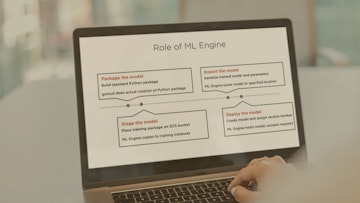
Building machine learning models using Python and a machine learning framework is the first step towards building an enterprise-grade ML architecture, but two key challenges remain: training the model with enough computing firepower to get the best possible model and then making that model available to users who are not data scientists or even Python users. In this course, Architecting Production-ready ML Models Using Google Cloud ML Engine, you will gain the ability to perform on-cloud distributed training and hyperparameter tuning, as well as learn to make your ML models available for use in prediction via simple HTTP requests....
Read more
Good to know
Save this course
Activities
Career center
Cloud Architect
Quantitative Analyst
Statistician
Operations Research Analyst
Financial Analyst
Business Analyst
Data Scientist
Market Research Analyst
User Experience Researcher
Data Analyst
Technical Writer
Software Engineer
Product Manager
Product Designer
Machine Learning Engineer
Reading list
Share
Similar courses
OpenCourser helps millions of learners each year. People visit us to learn workspace skills, ace their exams, and nurture their curiosity.
Our extensive catalog contains over 50,000 courses and twice as many books. Browse by search, by topic, or even by career interests. We'll match you to the right resources quickly.
Find this site helpful? Tell a friend about us.
We're supported by our community of learners. When you purchase or subscribe to courses and programs or purchase books, we may earn a commission from our partners.
Your purchases help us maintain our catalog and keep our servers humming without ads.
Thank you for supporting OpenCourser.


